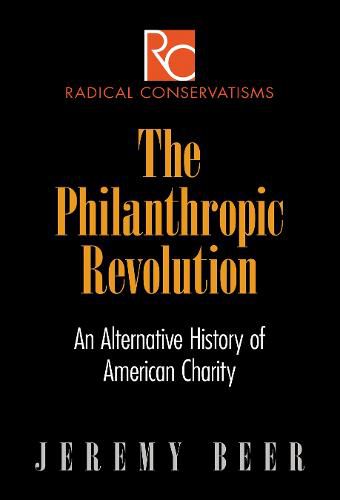Readings Newsletter
Become a Readings Member to make your shopping experience even easier.
Sign in or sign up for free!
You’re not far away from qualifying for FREE standard shipping within Australia
You’ve qualified for FREE standard shipping within Australia
The cart is loading…






This title is printed to order. This book may have been self-published. If so, we cannot guarantee the quality of the content. In the main most books will have gone through the editing process however some may not. We therefore suggest that you be aware of this before ordering this book. If in doubt check either the author or publisher’s details as we are unable to accept any returns unless they are faulty. Please contact us if you have any questions.
When we talk about voluntary giving today, we usually prefer the word philanthropy to charity. Why has this terminological shift taken place? What is its philosophical significance? How did philanthropy come to acquire so much prestige-and charity come to seem so old-fashioned? Was this change contested? Does it matter?
In The Philanthropic Revolution, Jeremy Beer argues that the historical displacement of charity by philanthropy represents a radical transformation of voluntary giving into a practice primarily intended to bring about social change. The consequences of this shift have included secularization, centralization, the bureaucratization of personal relations, and the devaluing of locality and place.
Beer shows how the rise of scientific charity and the new philanthropy was neither wholly unchallenged nor entirely positive. He exposes the way modern philanthropy’s roots are entangled with fear and loathing of the poor, anti-Catholic prejudice, militarism, messianic dreams, and the ideology of progress. And he reveals how a rejection of traditional charity has sometimes led philanthropy’s proponents to champion objectionable social experiments, from the involuntary separation of thousands of children from their parents to the forced sterilizations of the eugenics movement.
Beer’s alternative history discloses that charity is uniquely associated with personalist goods that philanthropy largely excludes. Insofar as we value those goods, he concludes, we must look to inject the logic of charity into voluntary giving through the practice of a modified form of giving he calls philanthrolocalism.
$9.00 standard shipping within Australia
FREE standard shipping within Australia for orders over $100.00
Express & International shipping calculated at checkout
This title is printed to order. This book may have been self-published. If so, we cannot guarantee the quality of the content. In the main most books will have gone through the editing process however some may not. We therefore suggest that you be aware of this before ordering this book. If in doubt check either the author or publisher’s details as we are unable to accept any returns unless they are faulty. Please contact us if you have any questions.
When we talk about voluntary giving today, we usually prefer the word philanthropy to charity. Why has this terminological shift taken place? What is its philosophical significance? How did philanthropy come to acquire so much prestige-and charity come to seem so old-fashioned? Was this change contested? Does it matter?
In The Philanthropic Revolution, Jeremy Beer argues that the historical displacement of charity by philanthropy represents a radical transformation of voluntary giving into a practice primarily intended to bring about social change. The consequences of this shift have included secularization, centralization, the bureaucratization of personal relations, and the devaluing of locality and place.
Beer shows how the rise of scientific charity and the new philanthropy was neither wholly unchallenged nor entirely positive. He exposes the way modern philanthropy’s roots are entangled with fear and loathing of the poor, anti-Catholic prejudice, militarism, messianic dreams, and the ideology of progress. And he reveals how a rejection of traditional charity has sometimes led philanthropy’s proponents to champion objectionable social experiments, from the involuntary separation of thousands of children from their parents to the forced sterilizations of the eugenics movement.
Beer’s alternative history discloses that charity is uniquely associated with personalist goods that philanthropy largely excludes. Insofar as we value those goods, he concludes, we must look to inject the logic of charity into voluntary giving through the practice of a modified form of giving he calls philanthrolocalism.